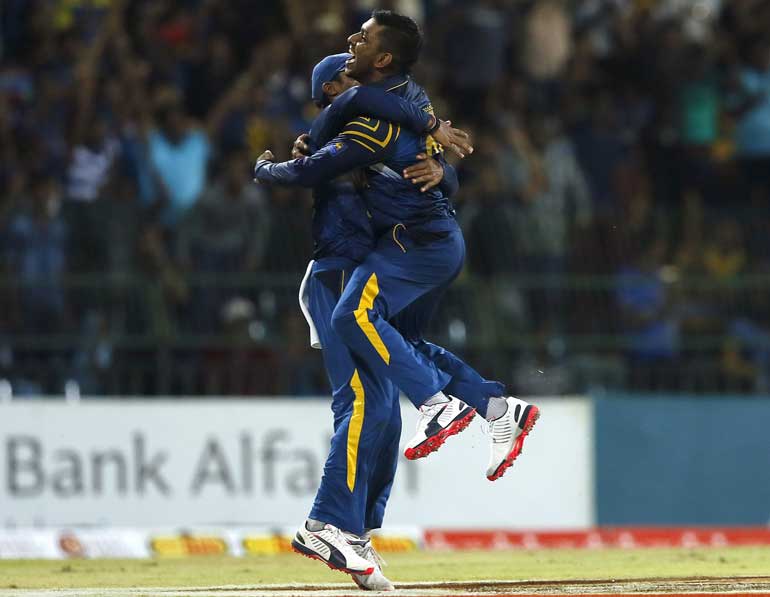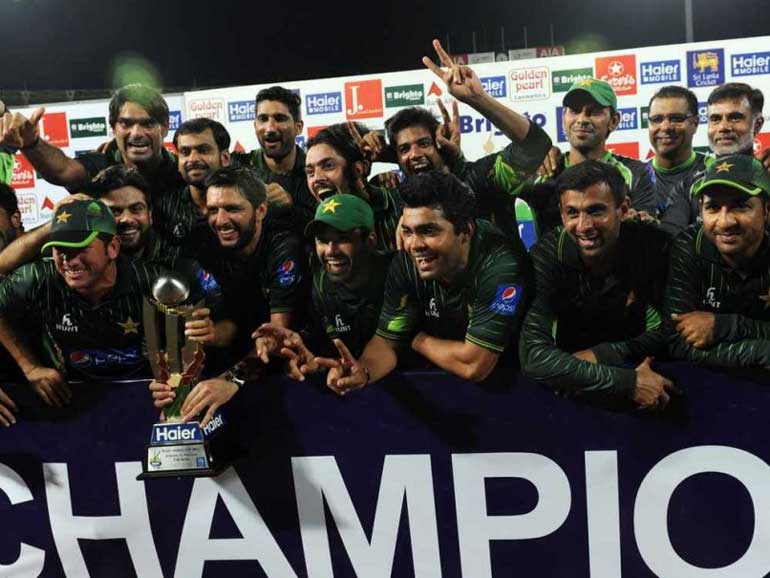Friday Feb 20, 2026
Friday Feb 20, 2026
Monday, 3 August 2015 00:00 - - {{hitsCtrl.values.hits}}

Captain Lasith Malinga used to hold centre stage but youngsters like Binura Fernando have been outperforming him of late - AFP 
Shehan Jayasuriya (R) celebrates with his teammate Jeffrey Vandersay after taking the wicket of Pakistan’s captain Shahid Afridi (not pictured) during their second Twenty20 cricket match in Colombo 1 August - Reuters/Dinuka Liyanawatte
ESPNCricinfo: So often the most polarising cricketer in Sri Lanka, this time Lasith Malinga was himself split on the value of his contribution to the T20 series. On one hand, he appeared almost distraught at his decline in bowling form. He not only suggested again that he lost Sri Lanka the match, but also conceded his career may come to an end if he doesn’t improve soon.
On the other hand, Malinga responded tersely to criticism of his influence over team selection. Six cricketers with two T20 caps or fewer played in the Sri Lanka team on Saturday, and Malinga believed he had done Sri Lankan cricket a service by showcasing these cricketers at the top level.
“The people who watched the match would have been able to see how talented the new players are and how useful they can be,” Malinga said. “Personally, I’m disappointed about my own form, but I happily take criticism as captain. I believe that even if I was criticised by one or two people, I was personally able to unearth two or three future national players. That’s what a captain should do.”
Malinga was Sri Lanka’s most expensive bowler for the second T20 running, and his figures of 1 for 40 from four overs played a role in the loss. Malinga’s international form has been indifferent since the middle of 2014, when a long-term ankle injury began to deteriorate further. He had surgery in September and was in recovery for 18 weeks before the World Cup.
“I played for a year and a half before the World Cup with an injury,” Malinga said. “I was using injections then. After that I had surgery. I didn’t have time to recover - the World Cup started. I went there and I wasn’t able to get my rhythm back. I’m playing cricket continuously and I think I might have a chance to get back into rhythm. If not, I expect better bowlers than me will develop in Sri Lanka. I came to the national team to fill someone else’s shoes. I think a good player will come and be suitable to take my place, in time.”
Malinga led Sri Lanka to the 2014 World T20 victory in Bangladesh and was reappointed T20 captain by the new selection committee this year. However, there have been reservations about his leadership, particularly about his man-management ability. These concerns have been inflamed by his recent dip in form.
“I don’t think I should step down as captain,” Malinga said. “What I hope is that I can work on my fitness. The selectors have the opportunity to give the captaincy to someone else. Whether I’m captain or not, I think I’ll have a chance to get back into form. If not, a better captain and a better bowler will replace me, and take Sri Lanka’s cricket forward.”
Questions have also been raised about the omission of Lahiru Thirimanne and Dinesh Chandimal from the T20 side, decisions Malinga is said to have influenced. Malinga, however, said he had done the right thing for Sri Lankan cricket by picking youngsters, given the limited number of T20 internationals scheduled before next year’s World T20.
“In past World Cups, I’ve heard and seen people say, ‘We should have brought that player’, or, ‘This other cricketer would have been better in these conditions.’” Malinga said. “But whether I’m the captain or someone else is, I thought that I would save the captain that fate. I wanted to choose a young group of players early and present them.
There’s no need to guess at how good the players are.”
Though Sri Lanka’s senior players have been underwhelming throughout the Pakistan tour, which the hosts have finished without a trophy, Malinga believed results would begin to improve soon.
“I don’t think Sri Lankan cricket will stagnate for long,” he said. “The new players we’ve introduced are already showing they are suitable for international cricket, and showing they have ability. Chamara Kapugedera, Milinda Siriwardana, Dhananjaya de Silva have all done that. They’ve all shown they have a long cricket journey.
“When seniors retire, it’s not the runs and the wickets we miss. The knowledge and their ability to manipulate matches - a skill they’ve gained over 14 or 15 years - is what is missed. It takes a while to build up that kind of knowledge. But in terms of producing good cricketers, I don’t think Sri Lanka will have much trouble.”

Karachi: Pakistan coach Waqar Younis Sunday hailed his players’ positive and attacking approach after they comprehensively defeated Sri Lanka in all three formats on the islanders’ home turf.
Pakistan clinched the second Twenty20 against Sri Lanka in a sensational last-over finish by one wicket to take the series 2-0 on Saturday, capping a successful tour where they also won the Test series 2-1 and one-dayers 3-2.
Waqar said the victory had made him proud of his players, and the team was on the up. “I would not say that we have become world beaters after winning the whole tour but I would say that we are heading in the right direction,” he told AFP via phone from Colombo.
“I think the best thing on this tour was that the mindset of the players has changed towards positive cricket.”
The former fast bowler attributed the team’s recent success in Tests, where they are now ranked third in the world, to finding the right blend of youth and experience.
“I think for the last one year we have been well settled in Tests as seniors support the juniors and everyone knows how to perform their roles,” he said, singling out batsmen Younis Khan and Shan Masood and leg-spinner Yasir Shah for extra praise.
On the one-day series victory, Waqar said the introduction of fresh blood had helped Pakistan improve their fielding and shed the go-slow approach that had hindered them in recent times.
“Azhar Ali, Sarfraz Ahmed, Mohammad Rizwan and Anwar Ali were outstanding,” he said.
“The change in world cricket was adopted by us, which was to smash the ball if it is there for a hit,” he added, referring to surging run-rates that have become a feature of one-day cricket following the arrival of the Twenty20 format.
Pakistan’s victory in the one-day series moved them from ninth in the rankings to eighth, thereby ensuring their qualification for the 2017 Champions Trophy in England.
Pakistan will next tour Zimbabwe, where they play three Twenty20s and as many one-day internationals from September to October.